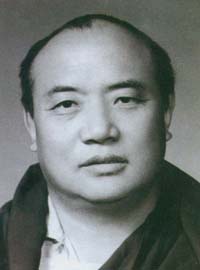Go Jump into the Pool

His Holiness the Sixteenth Karmapa was invited to Washington, D.C., in 1976, where he was the honored guest of Senator Charles Percy. At that time the Illinois senator was busy introducing the energy conservation bill on Capitol Hill, a major undertaking that occupied much of his time.
The Karmapa’s entourage stayed at the Percy mansion. Every morning Senator Percy would emerge to find that the Karmapa, who slept two or three hours a night, if at all, was already well into his day. And each morning His Holiness would always tell him: “Senator, go jump into the pool!”
The senator, who was devoted to His Holiness, had no choice but to comply, much to the living Buddha’s delight. The Karmapa would watch, and clap his hands with joy, while the dignified senator, self-conscious at first, would suddenly become boyish again and enjoy himself immensely. His Holiness, as a Buddhist monk, was denied the pleasure of swimming. Yet he would unfailingly say, day after day: “I enjoyed that swim even more than he did!” Thus the lordly Karmapa, who carried his own regal atmosphere with him wherever he went, ruled his kingdom.
Consciousness Transference
It was customary in Tibet to summon a lama when a family member passed away, which usually took place at home. Buddhist funeral rites would then be performed, and—if possible—the consciousness of the recently deceased would be transferred to Dewachen, a Buddha-field or transcendent paradise from which evolution on the path of enlightenment is said to be more easily assured. A powerful practitioner can instantaneously deliver his own consciousness, or that of the deceased, to such an enlightened realm—through the tantric practice known as phowa, or consciousness transference.
One day the head of a nomadic household in desolate, windswept northern Tibet passed away. In such a sparsely inhabited region it was rare to find monasteries and lamas, so the family members wondered what to do. Then they happened to notice a ragged individual traveling on foot who appeared as if he could be either an itinerant yogi or a beggar, so they went to inquire.
The mendicant turned out to be, in fact, a lama. The grieving family requested his ministrations for the deceased, and he complied. When he reached the man’s deathbed and began his incantations, the family respectfully requested the lama to perform phowa. The lama, however, said: “I am just a poor, unlettered practitioner of the Buddha’s teachings; I have not mastered that esoteric practice. But I do have one positive quality, infinite faith in the living Buddha named Lama Karmapa; he is like the great gate to Dewachen, that holy paradise beyond the setting sun. His name is the magic password to that fabulous spiritual domain.” Then he began reciting again and again the powerful name-mantra of the Karmapa, “Karmapa Khyenno!”
“Karmapa Khyenno, Karmapa Khyenno,” he intoned loudly, again and again. After each and every rosary of one hundred and eight fervent recitations, he would then hit the corpse with his mala, or prayer beads, commanding that in the name of the Buddha Karmapa the spirit of the deceased be reborn in Dewachen.
After some time, everyone noticed that the signs of successful consciousness transference began to appear. Hair fell from the top of the corpse’s head, there was a pleasant fragrance in the air, and a large bump appeared at the crown aperture where the subtle consciousness of the deceased had departed for the other world. Everyone present rejoiced, and gratefully thanked the mendicant lama. All began to faithfully practice the mantra of the Karmapa, praying to realize the great freedom and bliss of Dewachen in this very lifetime.
The traveling lama soon continued on his journey. One day he heard that the omniscient Karmapa was visiting south Tibet, so he determined to go and meet him and pay his respects.
Upon finally reaching his destination, the first thing the clairvoyant Karmapa said to him was: “That was a difficult phowa we performed up there in the north, wasn’t it?” The Karmapa laughed, hitting the other lama with his rosary. Then the mendicant knew with unshakable certainty that the Karmapa is an omniscient living Buddha, who always keeps his disciples, wherever they are, in his heart and mind.